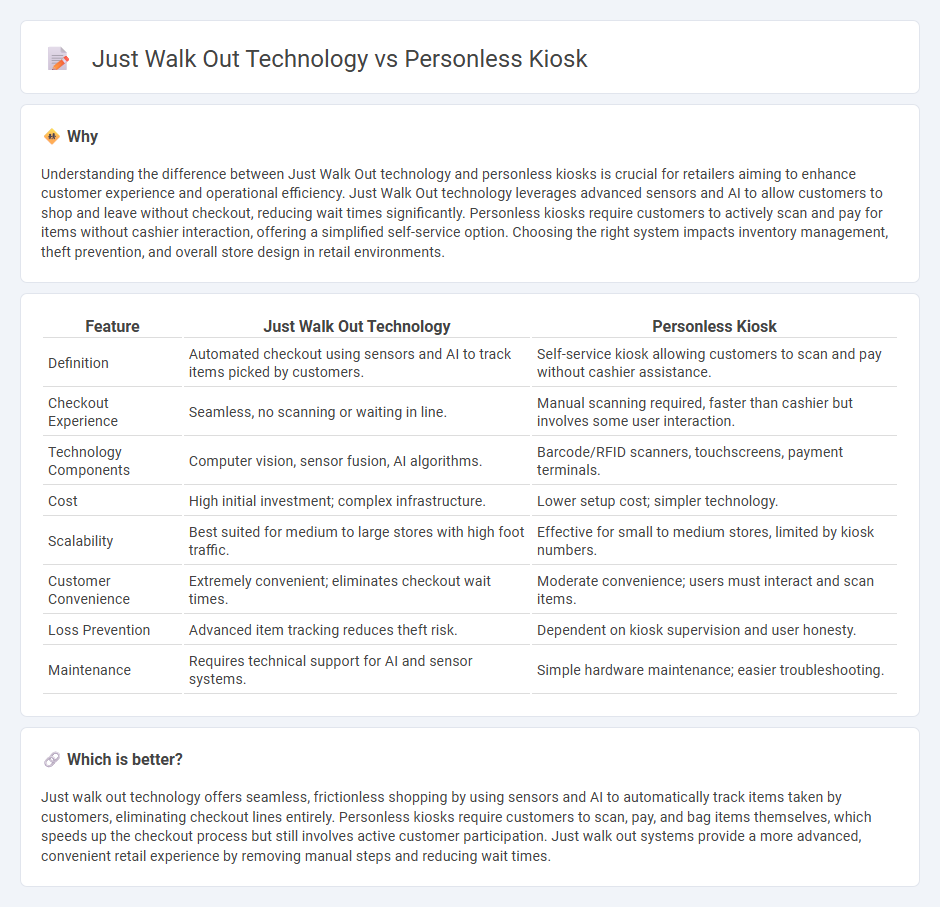
Just walk out technology leverages advanced sensors, computer vision, and AI to enable customers to shop and leave without stopping to pay, streamlining the retail experience and reducing checkout times. Personless kiosks use automated systems and self-service terminals to facilitate transactions without direct human interaction but often require customers to engage with the device to complete purchases. Explore the distinctions and benefits of these cutting-edge retail innovations to see which solution fits your business model best.
Why it is important
Understanding the difference between Just Walk Out technology and personless kiosks is crucial for retailers aiming to enhance customer experience and operational efficiency. Just Walk Out technology leverages advanced sensors and AI to allow customers to shop and leave without checkout, reducing wait times significantly. Personless kiosks require customers to actively scan and pay for items without cashier interaction, offering a simplified self-service option. Choosing the right system impacts inventory management, theft prevention, and overall store design in retail environments.
Comparison Table
| Feature | Just Walk Out Technology | Personless Kiosk |
|---|---|---|
| Definition | Automated checkout using sensors and AI to track items picked by customers. | Self-service kiosk allowing customers to scan and pay without cashier assistance. |
| Checkout Experience | Seamless, no scanning or waiting in line. | Manual scanning required, faster than cashier but involves some user interaction. |
| Technology Components | Computer vision, sensor fusion, AI algorithms. | Barcode/RFID scanners, touchscreens, payment terminals. |
| Cost | High initial investment; complex infrastructure. | Lower setup cost; simpler technology. |
| Scalability | Best suited for medium to large stores with high foot traffic. | Effective for small to medium stores, limited by kiosk numbers. |
| Customer Convenience | Extremely convenient; eliminates checkout wait times. | Moderate convenience; users must interact and scan items. |
| Loss Prevention | Advanced item tracking reduces theft risk. | Dependent on kiosk supervision and user honesty. |
| Maintenance | Requires technical support for AI and sensor systems. | Simple hardware maintenance; easier troubleshooting. |
Which is better?
Just walk out technology offers seamless, frictionless shopping by using sensors and AI to automatically track items taken by customers, eliminating checkout lines entirely. Personless kiosks require customers to scan, pay, and bag items themselves, which speeds up the checkout process but still involves active customer participation. Just walk out systems provide a more advanced, convenient retail experience by removing manual steps and reducing wait times.
Connection
Just Walk Out technology revolutionizes retail by enabling personless kiosks, allowing customers to enter stores, pick up products, and leave without traditional checkout lines. These kiosks integrate advanced sensors, computer vision, and AI to automatically detect items taken or returned, streamlining the shopping experience. This seamless connection reduces labor costs and enhances convenience, driving higher efficiency and customer satisfaction in modern retail environments.
Key Terms
Self-Checkout
Personless kiosks utilize advanced sensors and AI to enable seamless self-checkout experiences without staff intervention, reducing wait times and labor costs. Just walk out technology integrates computer vision, sensor fusion, and deep learning to automatically track items and charge customers as they leave, eliminating the need for manual scanning. Explore the latest innovations transforming retail checkout efficiency by learning more about these cutting-edge self-checkout solutions.
Computer Vision
Personless kiosks rely on computer vision for identity verification and product recognition, enabling automated checkout without cashier interaction. Just walk out technology enhances this by combining multi-camera computer vision systems and advanced sensors to track shopper behavior and item removal in real time with high accuracy. Explore how computer vision transforms retail automation and customer experience to learn more.
RFID (Radio-Frequency Identification)
Personless kiosks rely heavily on RFID (Radio-Frequency Identification) technology to enable seamless product scanning and automated checkout without cashier intervention. Just walk out technology combines RFID with sensors and computer vision to track items and confirm purchases as customers exit, creating a frictionless shopping experience. Discover how RFID integration revolutionizes automated retail by exploring its applications and benefits in these systems.
Source and External Links
Touchless Self-Service Digital Kiosks - imageHOLDERS - Touchless self-service kiosks enable users to interact with a kiosk display using mid-air hand gestures, eliminating physical contact and reducing the risk of germ spread, making them ideal for hygienic visitor management, wayfinding, and equipment booking.
True Go Self-service Kiosks: The Future of Unattended Retail - Unattended retail kiosks operate without human staff and use technologies like voice recognition and cashless payments to provide fast, hygienic service for retail, food service, and other sectors while addressing staffing shortages.
How Does Amazon Go Work? Exploring Self-Serve Stores Technology - Woz U - Amazon Go stores use a combination of smartphone apps, facial recognition, and tracking cameras to allow shoppers to pick items and leave without checkout, representing an advanced form of personless kiosk technology in retail environments.
 dowidth.com
dowidth.com